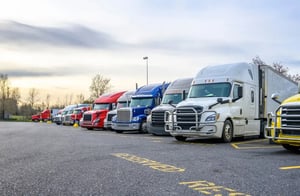
Truck Parking Management System
Why Truck Parking Management Is a Major Concern for Cities
Managing truck parking is a high-level challenge for cities and transportation hubs across the country. Limited parking availability forces drivers to spend precious time searching for spaces, leading to congestion, wasted fuel, and delays.
These inefficiencies negatively impact regional and nationwide supply chain strategies, affecting delivery times and increasing emissions. Cities can’t allocate parking efficiently without real-time data, leaving truckers circling for hours.
A smarter, data-driven approach is essential to solving these challenges. Integrating the Omnisight FusionSensor into a community’s truck parking management system provides cities and departments of transportation with a solution that improves efficiency and safety.
Access to real-time data optimizes truck parking space, improving supply chain efficiency and safety for truck drivers and their cargo.
Here’s a closer look at the major challenges in truck parking management and how connected infrastructure solutions like the FusionSensor can help overcome them.
Main Challenges of Truck Parking Management
Modern cities and transportation networks face several critical challenges when managing truck parking:Objectives of a Truck Parking Management Plan
A comprehensive truck parking management plan can help cities address these challenges while supporting safer roads and more efficient and responsive supply chains. Key objectives include:
- Real-time parking information. Implementing a truck parking information management system allows drivers to access live updates on parking availability, reducing congestion and minimizing time spent searching for spots.
- Long-term integration. Integrating truck parking into city infrastructure planning ensures urban areas can meet growing demand without compromising traffic flow or safety.
- Enhanced security measures. Assessing parking facility security and implementing technologies like sensors and lighting can deter crime and improve driver safety.

How the Omnisight FusionSensor Supports Truck Parking Management Systems
The FusionSensor allows cities to efficiently manage truck parking spaces. This advanced sensor combines HD video, artificial intelligence (AI), and HD3D radar to provide live parking data with 98.7% accuracy—even in harsh weather conditions.
Here’s how it supports smarter parking solutions:
- High-accuracy object detection. The FusionSensor instantly updates parking systems with continuous monitoring, guiding drivers to open spots. This reduces congestion, optimizes space use, and keeps supply chains moving.
- Accurate parking spot detection. The continuous monitoring of parking occupancy helps the FusionSensor deliver instant updates to truck parking management systems, guiding drivers to open spots quickly. This reduces congestion, helps optimize space use, and supports supply chain efficiency by minimizing delays.
- Sustainable truck parking solutions. Reducing the need for trucks to circle in search of parking decreases emissions and fuel consumption. The FusionSensor contributes to reducing costs and creating more sustainable urban environments, aligning with eco-friendly supply chain strategies.
Why Improving Truck Parking Means a More Efficient Supply Chain
Smart truck parking management doesn’t just benefit drivers—it is necessary for the transportation industry. With real-time data, logistics companies can make informed decisions about routes and rest stops, leading to:
- Improved efficiency. Reduced search times for parking mean fewer lead time delays, allowing drivers to maximize their hours of service and improve on-time deliveries.
- Better safety and compliance. Safer, well-managed parking facilities ensure drivers can rest securely, supporting compliance with federal hours-of-service regulations.
- Supply chain optimization. Efficient parking management leads to better route planning, minimizing delays, and improving overall supply chain performance. The live data supports demand forecasting systems and connected infrastructure so that parking capacity aligns with customer demand.
Develop Smarter Truck Parking Solutions With Omnisight
Truck parking inefficiencies are costing cities and logistics companies valuable time and resources. The Omnisight FusionSensor provides the real-time insights needed to reduce congestion, improve safety, and streamline supply chain operations.
Ready to optimize truck parking and take control of supply chain efficiency? Contact us today to learn how our sensor systems can integrate into your truck parking management system.
